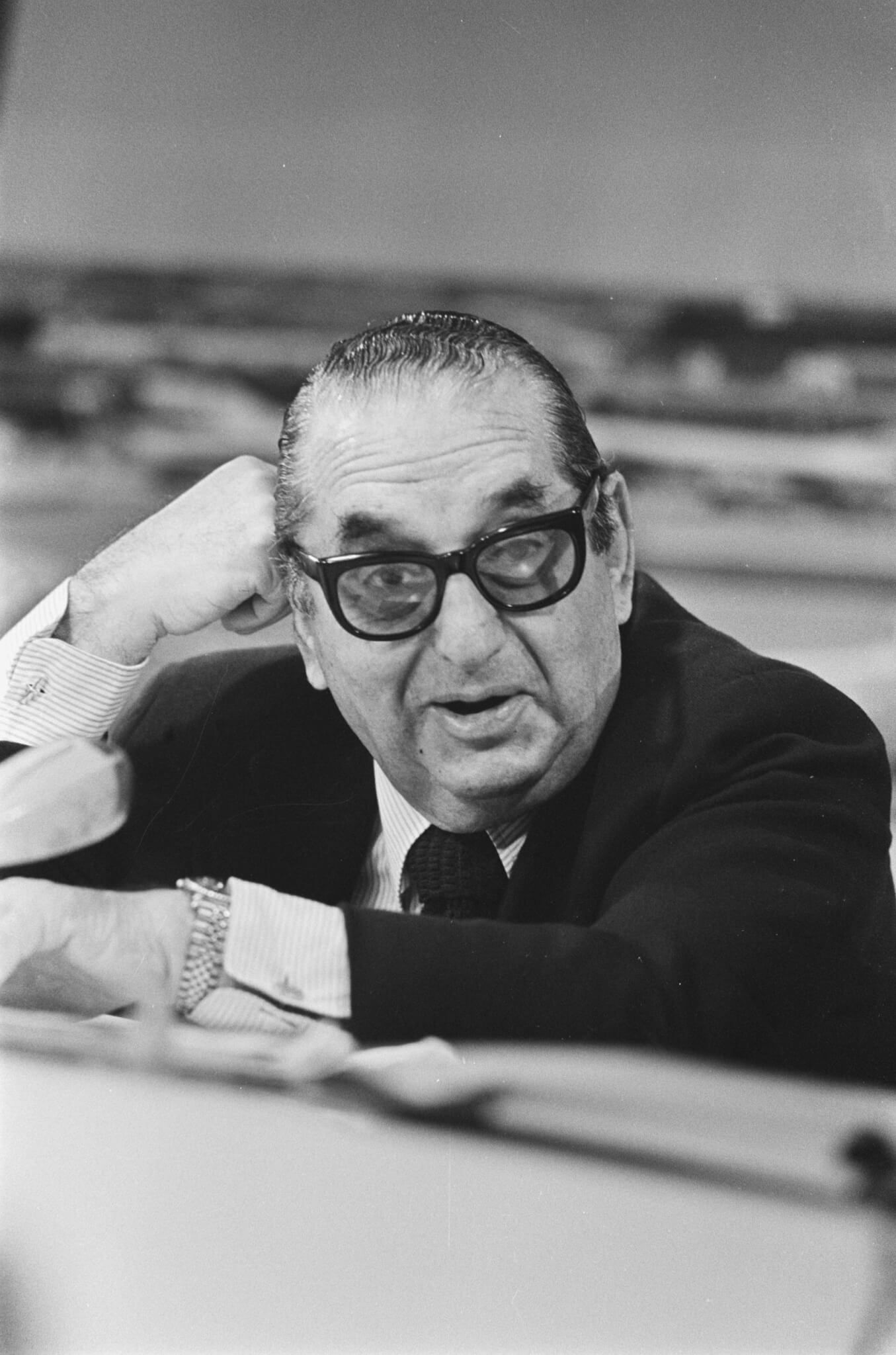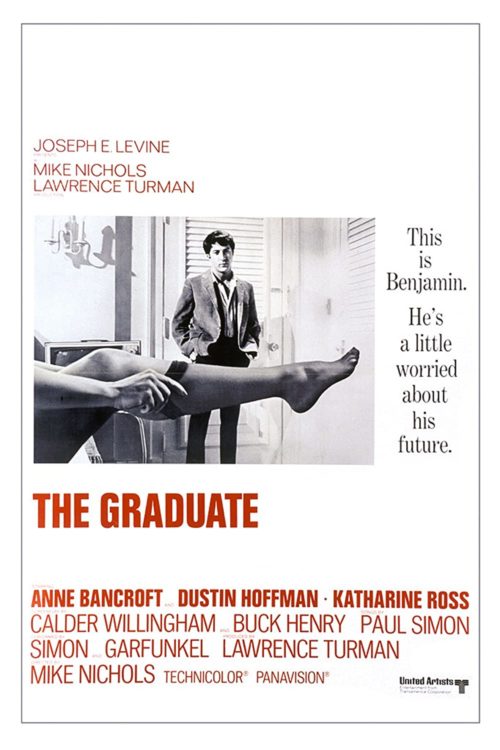Joseph Levine
Joseph Levine grew up in a Russian Jewish immigrant family in the West End, and became one of the most successful movie producers and distributors in the United States during the 1950s, 60s, and 70s.
Joseph Levine was born in the West End, on September 9, 1905, to Russian Jewish immigrant parents. The youngest of six children, Levine and his family moved between tenements on Poplar Street, Minot Street, Hollander Street, and Billerica Street. His father, a tailor, died when Levine was four; Levine’s mother soon re-married but divorced when he was seven. Levine worked from a young age selling newspapers and seeking to carry people’s bags on their way to the train, in exchange for payment. He also stole certain basic necessities for his family, such as firewood, and remarked later that “we were in the iron and steel business. My mother did the ironing and I did the stealing.” As a teenager, Levine lived in Roxbury, but he identified the West End with his formative years. He spoke well of close friends yet also experienced anti-Semitism living in Boston: “When they had a pogrom in Poland, we’d have one on Billerica Street the next week…I remember nothing good about Billerica Street.” While experiencing this hardship, Levine dropped out of school at fourteen years old to pursue a variety of jobs to support his family. He swept floors and ran errands for a dress factory, and played the drums and sang for local choirs. Around the age of 17, Levine joined his brothers in establishing Le Vine’s, a dress shop they named with a French-sounding variation on their surname. But he quickly sold his stake to his brothers in order to make a living in New York, before returning to Boston in the 1930s as a co-owner of Cafe Wonderbar on Mass Ave.
While working at Cafe Wonderbar, Joseph met Rosalie Harrison, his future wife; she was a backup singer for Rudy Vallee, a pop star and teen idol of the 1930s. They married in 1938, and stayed together until Levine’s death. Both Joseph and Rosalie were regularly covered by the Boston Globe in the society pages, Rosalie for her music career and Joseph for being a regular ‘face’ of the city at the Wonderbar. Rosalie did not want Joseph to be working in clubs forever, so he entered the movie business, founding the Embassy company in 1938. He worked as a movie distributor and producer throughout New England for a long time before his big break, first with “Godzilla,” when he bought the rights to the Japanese film and released it in 1956, and “Hercules,” in 1959. Levine purchased the rights to the movie, originally an Italian film, for $120,000, and spent an equal amount on dubbing the film in English and creating new sound effects. After spending $1 million on advertising, Levine had 600 theaters showing “Hercules” at the same time, grossing over $15 million in revenue. Levine held a large lunch gathering at the Waldorf-Astoria hotel in New York, on March 18, 1959, to host over 1,000 people from the United States, Paris, Rome, and Canada to celebrate the opening of “Hercules” in July. He later remarked that Hercules himself “would have been a stronger and better hero” had the Roman god lived in the West End.
As a movie producer, Levine’s pioneering strategy was two-fold: saturation screening (playing the same movie at numerous theaters on multiple screens) and large advertising budgets. Levine is credited with saying “you can fool all the people all the time if the advertising is right and the budget is big enough.” For example, Levine once put down $5,000 to borrow $1 million from a bank in Boston, just to show off an armored vehicle with cash to prospective movie exhibitors in New York. Levine insisted to them that the $1 million would go entirely to promoting “Jack the Ripper,” which he purchased the rights for from Britain, and theater executives fell for the ploy. Murray Schumach, in a special report for The New York Times in 1961, wrote that Levine’s extravagance made others in the movie business “feel stingy and others feel slightly tainted with unrefinement.” He continued that Levine “believes in spending money to make money.” With his many successes, Levine became a household name and returned to Boston not only to receive honors, but also to reconnect with long-lost friends, such as when he spoke at a West Enders’ dinner in 1962. The documentary Showman (1963) covers Levine’s reunion with childhood friend Hilkey Alpert, who he met on Billerica Street, at the dinner. He also received the Minute Man Award from the Advertising Club of Greater Boston in December of 1965, an honorary doctorate in Business Administration from Bryant College (Rhode Island) in May of 1967, and citations from the Massachusetts House of Representatives and State Senate in April 1968. When Levine spoke to the legislature about the honor he received, he remarked that he was an “old West End boy who made good.”
Levine’s greatest success came from producing “The Graduate,” the 1967 movie starring Dustin Hoffman and Anne Bancroft. He told Jacob Brackman from The New Yorker that “we thought we had a commercial picture here, but we didn’t know what we had…It’s absolutely incredible. There’s no way to describe it. It’s like an explosion, a dam bursting,” describing his astonishment at how the movie continued to sell out theaters. Levine also produced “The Producers” in 1968, giving director Mel Brooks a shot when other studios were uninterested in his script. Levine stepped down from Avco-Embassy Company in 1974 to create his own independent production studio, Joseph E. Levine Presents. He took this route because he felt that he would have more freedom spending his own money than other people’s money, guided as much by his love of movies as the desire to make money. Levine said at the time that in movie production then, “there’s too much Wall Street influence, guys who care only about making money. I love making money and I’m damn good at it, but I also love making pictures. I don’t consult banks or boards of directors. I’m still willing to pay millions for a feeling in my gut.”
Joseph Levine died on September 30, 1987 in Greenwich, Connecticut after a long battle with an illness. As a world-renowned movie producer, he never forgot about his roots in the West End.
Article by Adam Tomasi
Source: Los Angeles Times; A.T. McKenna, Showman of the Screen: Joseph E. Levine and His Revolutions in Film Promotion (2016; JSTOR); Politics and Popular Culture in America Today (1991; for Levine quote about advertising); ProQuest (“Joseph Levine Hosts Herculean Kickoff For ‘Hercules’ Film,” Boston Globe, March 18, 1959, page 16; Murray Schumach, “Movie Producer Sells the Public,” The New York Times, November 9, 1969, page 39; “Ad Men Give Bowl to Joseph Levine,” Boston Globe, December 8, 1965, page 67; “Bryant College Plans to Honor Joseph Levine,” Boston Globe, April 22, 1967, page 21; George McKinnon, “Big day for an ‘old West End boy’,” Boston Globe, April 17, 1968, page 31)









